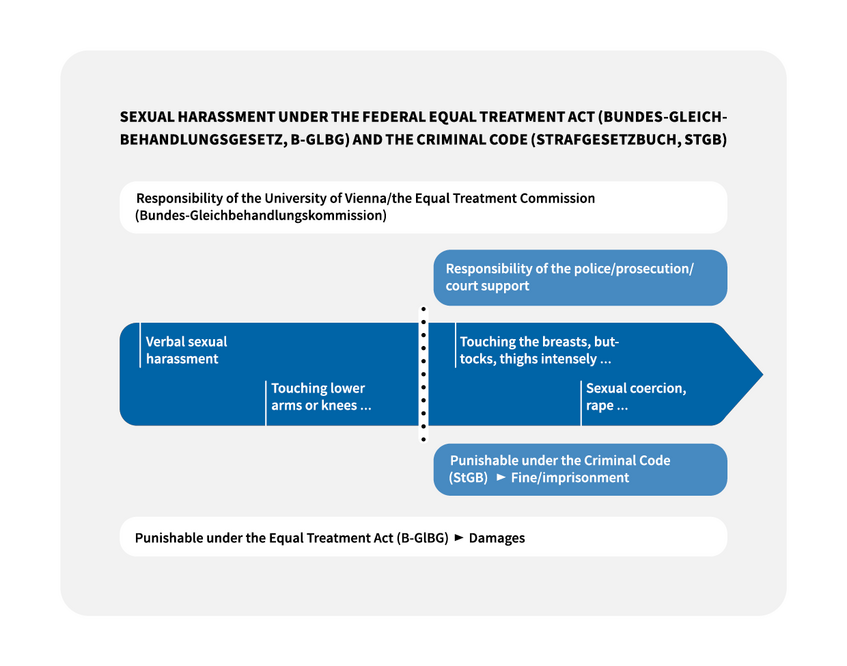Sexual harassment
Sexual harassment is a form of gender-based discrimination. It can be:
- verbal, e.g. sexist jokes, suggestive remarks about someone’s body and appearance, questions about sexual preferences etc.
- nonverbal, through gestures and looks: e.g. insistent staring at certain body parts, derogatory or obscene gestures, showing or displaying sexist/pornographic imagery etc.
- physical, through unwanted proximity and touching (“accidental” or obvious)
Both members of staff and students are subject to the harassment ban in connection with employment, training or higher education. The Federal Equal Treatment Act (Bundes-Gleichbehandlungsgesetz, B-GlBG) prohibits university staff and students from engaging in sexual harassment towards others.
The university is also responsible for protecting its members of staff and students, i.e. preventing sexual harassment and taking appropriate action when an incident becomes known. This protection against harassment also applies to incidents that occur outside the place of work or study (e.g. on field trips, at conferences, on research trips, at job-related meetings outside of university, online etc.). The scope of protection applies as soon as there is a thematic connection with work, training or higher education.
Good to know
- According to a study by UniSAFE (2022), 31 % of employees and students experience sexual harassment within their institution.
- Sexual harassment is not primarily caused by unsuccessful advances and usually stems from an abuse of power.
- Sexual harassment can poison the work environment and lead to colleagues withdrawing from work or higher education.
- Sexual harassment is not a conflict between two (or several) people. It is a form of dominance and subjugation.

Source: Fact Sheet: Sexuelle Belästigung nach dem Gleichbehandlungsgesetz und dem Strafgesetzbuch. Gleichbehandlungsanwaltschaft. Adaptation for the University of Vienna by the Culture and Equality unit.
Graphic by Marion Wotruba: www.m-wotruba.at
Image description: The image shows the legal competencies in cases of sexual harassment. Depending on the severity of the harassment, different laws can be applied. There are four different degrees of severity: first, verbal sexual harassment, second, touching lower arms, knees and the like, third, touching the breasts, buttocks, thighs intensely and the like, and fourth, sexual coercion, rape and the like. Independent of severity, harassment always falls under the responsibility of the University of Vienna and the Equal Treatment Commission (Bundes-Gleichbehandlungskommission). Also independent of severity, harassment is always punishable under the Equal Treatment Act (Bundes-Gleichbehandlungsgesetz) and can lead to payment of damages. Only with the third degree of severity, intense touching, and above the police, prosecution and court support are also responsible. Then, the harassment is also punishable under the Criminal Code (Strafgesetzbuch) and can lead to fines and imprisonment.
English subtitles available.
